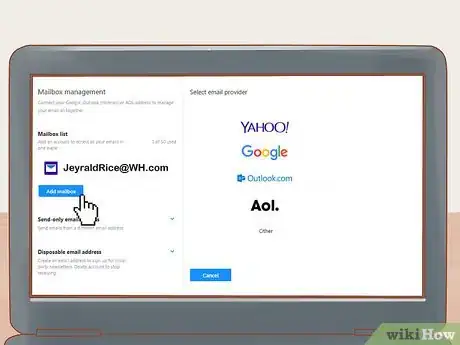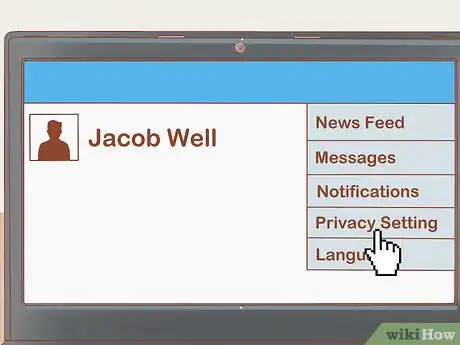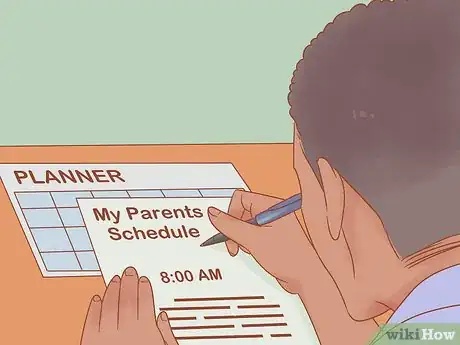This article was co-authored by Erika Kaplan. Erika Kaplan is a Dating Coach and Matchmaker for Three Day Rule, an exclusive matchmaking company across nine cities in the United States. With over six years of experience, Erika specializes in helping singles find quality matches through date coaching and premium matchmaking services. Erika graduated from Penn State with a Bachelor’s degree in Public Relations. She worked for Rolling Stone, Us Weekly, and Men’s Journal before leaving publishing to pursue her passion for connecting people. Erika has been featured on Lifetime, the Philadelphia Inquirer, and CBS as well as in Thrillist, Elite Daily, Men’s Health, Fast Company, and Refinery29.
wikiHow marks an article as reader-approved once it receives enough positive feedback. This article received 15 testimonials and 100% of readers who voted found it helpful, earning it our reader-approved status.
This article has been viewed 551,857 times.
Do you have a relationship you want to hide from your parents? Whether you’re keeping it a secret because you’re too young or because your parents won’t approve, there are steps you can take to keep your relationship under wraps. Keep reading for tips on how to prevent your parents from finding out about your relationship, plus how to decide if keeping your partner a secret really is the best choice for your situation.
Steps
Examining Why You Should Hide Your Relationship
-
1Evaluate your priorities. Decide if it's actually a good idea to keep your relationship from your parents. Do your parents disapprove of your relationship because they are strict, protective or worrisome? Does culture, gender, religion, or an age difference factor into their disapproval?[1] While your parents have the benefit of life experience, only you know what your relationship is worth to you.
- Talk to your friends and support system. Remember that if you keep your relationship a secret, the greater the potential problems will be when it comes to light. You have a support system to help guide you in the right direction.
- If you just don't think the relationship is serious enough yet and don't wish your parents to make a big deal of it, some of the following instructions may be excessive. Consider how your parents may feel if you exaggerated the need for secrecy; they may feel disappointed and wonder why don't you trust them.
- Take risks prevention if you really go ahead. For example, think about what would you do if you are caught by your parents, think about what would you do if your parents know you are owning a separate social media account/secret cell phone that makes use to communicate with your partner, think about what would you do if your dating relationship goes wrong, think about what would you do if you broke up, etc. Consider whether these risks/consequences are affordable. It is recommended to be honest if you are getting caught. Once you get caught, more lies would only make you get into greater trouble, damaging a family relationship. As for dating relationship goes wrong or challenges comes, you will need great mental and physical quality to afford it without any support from your parents.
-
2Communicate with your partner. If you want to pursue your relationship despite knowing that your parents will disapprove, let your partner know why you think that this is the right course of action. Your partner may feel less important and bring resentment to your relationship if you don't clarify your stance. The longer you hide, the more difficult it is going to be.[2]
- Your partner may have a valid argument if they have been through this situation before. For example, just because it is your first interracial relationship, it may not be the first time for your partner. They may have practical advice to help you understand where your parents are coming from and, above all else, having their support can help ease your stress.
- Your partner may also misunderstand the situation. Some people expect to be introduced at the start of a serious relationship, some are cool with waiting, and some do not wish to be introduced for quite some time.
Advertisement -
3Consider the opinions of your parents. It may be difficult to hear negative opinions about someone you care about, but sometimes your parents may have a better perspective on long-term outcomes. Depending on your dynamic with your parents, they may have trouble articulating their disapproval.
- Relationships with parents can be complicated. It may be difficult to be open and honest but keep your communication respectful so as not to escalate the situation. For example, while you may think that you are hiding your emotions, you actually may be coming off passive-aggressive or snarky.
-
4Remember all healthy relationships are built on trust, respect, and communication. Whether you are trying to strengthen your relationship with your partner or maintain the relationship with your parents, trust, respect and open transparency have to be present for a lasting relationship. If you plan on hiding your relationship, ask yourself why sacrificing your parent's trust is the only option.[3] Physical and emotional well-being should not be sacrificed for anyone, including your parents or partner.
- Will your parents become physically or verbally abusive if they found out about your relationship? Is any aspect of your relationship conflict with your parents’ beliefs? If your parents’ disapproval is based on prejudice or if their reaction is abusive, seek professional help. Your mental and physical health is your first priority.
Overcoming Overbearing Parents
-
1Be mature. Your parents will always be protective so show them that you are old enough to handle the responsibilities of a relationship. Firstly, show your parents that you are responsible and can follow all the rules. If your parents think you are too young for a relationship, be on time, do your chores, and study. If you can gain your parents' trust, then your parents will soon realize that you are mature enough to handle a relationship.
-
2Understand the risks of sexual activity. Parents often forbid relationships for fear of unplanned pregnancies and sexually transmitted infection. Ensure that you and your partner truly understand these risks. There is a real possibility that if you are not prepared, and you do have an unwanted pregnancy (if pregnancy is a possibility) or contract an STD/STI, your parents may not be there to support you or just can't help you (e.g., they can help you with bringing up a child to some extent, if they wish to do so; but they can't cure HIV).[4] You may not agree with your parents rules, but communicate with your partner and respect each other's boundaries to ensure you are both prepared and safe.
- Know that you should be respected by your significant other and that they should listen to your choices. Compromise is vital in a relationship, but this is one area where neither party should have to compromise their beliefs. Know that if you are eager to take the relationship to another level but your partner isn't ready, you must respect their choice. Never pressure your partner.
-
3Avoid PDA moments. Be discreet about your affection. You never know who is watching. A trusted friend may accidentally tell your parents in passing, not knowing that your relationship is a secret.
- Stealing kisses in public and other forms of PDA may seem harmless but remember that if your parents find out, they may think that your relationship has already crossed further into the intimacy threshold.
- If you want to show affection towards each other, only do it in private.
-
4Buy one new cell phone secretly. If it is possible to do so, owning a separate cell phone can help you in concealing information, but please remember that you must hide your new phone properly or you will be in trouble. If you are not able to buy one new phone, you may put a password in your original cell phone and computer if feasible. However, it is not advised to do so. Putting or changing a password on shared computer/cell phone may get suspicious, even some parents may ask you to unlock/undo the password set when they check your phone or use the family computer.
- Delete the messages on your phone when you sleep or leave your phone unattended. It is recommended to delete partly instead of all messages because you may get suspicious if the messaging history is blank.
- It is best to use Incognito mode on a browser when you are online. Otherwise, erase browsing history after you have been online. However, erasing browsing history may look suspicious if the browser history has never been erased on a shared device, but if you use Incognito mode, you don't need to worry about this.
- In case your parents check your phone, either don’t put your partner’s number on your phone or use your partner’s nickname/surname instead of their actual first name. It is also possible to use the different form of their name. For example, Brian becomes Brianna and Stephanie becomes Stephen. However, it is best to memorize your partner's contact information in your mind and don't put any of their contact information on your phone.
-
5Tell your partner not to post anything on social media sites or send instant messages. If you have a social media account or use other instant messaging apps, your parents could check up on you or hear from someone else with access to your account.
- Create an alternate account that you can use to be romantic with your partner. This is a handy tool when dealing with long distance relationships.
-
6Have a cover. The trustworthy friends take two jobs: Helping you on hiding the relationship and giving you advice on your relationship.
- They can support you on hiding the relationship such as collaborate on stories for your parents if you're on a date. Not only those friends can be a great cover-up for phone calls or texts, but they also act as an Intelligence Agency so that you can beat yourself to the punch to take prevention. For instance, you friends find out your parents would go to somewhere on someday, then you should take consideration before you want to meet with your partner.
- The another job of them is monitoring your relationship. You should acquire a political wisdom: The more voice, you make smarter decision. It is better to have more than one reliable friends so that you can listen to more than one voice if you have lots of resources to do this, even your friends could form a 'House'. However the biggest disadvantage is the larger social group, the greater chance of secret leakage even through they are royal. If your friends has concerns about your partner or refuses to continue being your alibi, heed their advice. It’s easy to think that one source is wrong, but if multiple sources are telling you not to continue your relationship, perhaps it’s best to listen to their logic. Using them as an excuse if they don't agree to it is unfair to your friend.
-
7Hide gifts. It is best to hide all the gifts safely. It could be at the outside of your home at your trustworthy friend's home, rent storage, your partner's home, etc. It is strongly advised not to keep the gifts at your home because your parents could find these gifts easily if they are intended and diligent in scanning every corner of your house thoroughly.
- You're going to draw attention from your parents if you suddenly lock your closet or room.
- You can also agree to treat each other to lunches or movies rather than giving physical gifts.
Managing Collateral
-
1Prevent your friends from commenting about your relationship with anyone. Whether it's telling people in passing or posting on each other's social media pages, convey how catastrophic it would be if their innocent comment made its way to your parents. Social media can be especially dangerous because you never know who is connected to whom.
- Ask your friends politely not to post any incriminating comments or pictures. It may be a wise idea not to let anyone take any pictures when you are in a group setting with your significant other.
-
2Use multiple social media accounts. The great thing about social media is that the larger sites are free. Set up as many accounts as you need to cover your tracks. Remember your password and only log on when using a device not shared with your parents.
-
3Set up a shell email account. Not only would a fake email account be advantageous because your parents won't recognize it, but you should also use it to set up your fake social media account. Remember that your parents can search for you on social media based on your email info.
-
4Adjust your privacy settings on social media. All social media will give you an option to filter what information you share with the public. Go to the Settings Menu and set up your profile so that only you and your partner have access to it. You can also select a few friends to be able to view your profile if you deem them trustworthy.
- You will have the opportunity to filter your updates and postings so that you can block your parents from seeing. However, the best way to block your parents from seeing is not to post anything damaging at all.
-
5Provide false information when creating shared social media accounts or when together in a public gathering. Remember that your parents can search social media sites via your date of birth, phone number, last name, school, or job. Don't make the mistake of creating a false account without ensuring every detail won't lead back to you.
- Change your profile name completely. Don't use your middle name, your name spelled backward, or the name of your dog. Anything remotely close to you may end up giving you away in the long run. It's better to exercise extreme caution.
-
6Hide your emotions. If you get into an argument with your partner, try not to show your parents how angry or sad you are. Don't emote in public for it to get back to your parents. Find an outlet to release your emotions. It may be difficult to be unable to share your emotions, so research ways to prevent emotional outbursts.
- For example, taking up boxing may work to vent frustration while listening to upbeat music in headphones may be enough to cheer you up after an argument with your partner. Only you know how to handle your emotions.
-
7Keep track of what you are telling everyone. If you are lying to a lot of people, it will become difficult to keep track of all the details. Keep your stories consistent and try to keep it as simple as possible. The more details you add, the more difficult it will be to remember them all.
-
8Frame your partner as a platonic relationship. Don't let your parents get suspicious you are hiding a relationship from them by letting them know that you have a platonic relationship with your partner that demands your time. Introduce them openly and talk about them the same as any other platonic relationship in your life.
- For example, if you introduce them as your coworker, you can talk about work-related issues and meetings and how you and your partner have supported one another through deadlines.
-
9Change your routine. Meet your partner at places that you would not normally go to and that your parents are not aware of. Change your social calendar so that you leave no chance of getting caught by your parents or someone who could tell your parents. Better yet, find out your parents' schedule. Not only will you be able to have peace-of-mind knowing where your parents are but you will also be able to meet your partner as far away from them as you can.
Dealing with a Difference in Age
-
1Ask yourself if you feel like yourself around your partner. Your partner should accept you for who you are and your parents may not be able to see beyond the age difference. Once your parents see that your relationship is healthy and that you are a better person for it, it will be easier for them to see beyond the age gap.[5]
-
2Keep perspective. It’s easy to get swept up in the allure of dating someone older or younger than you. Look ahead and see if the age difference will affect you in any way. Your parents may be fearful that the age gap may widen as your relationship continues.[6]
- A difference in age may be more of a big deal if you are younger. Your parents may be fearful that you are growing up too soon or that an older partner is taking advantage of you. A big age gap if you're a minor and your partner isn't may also be illegal if you're a minor. Take their perspective into account when continuing your relationship.
-
3Understand any power dynamics. If your partner is your professor or boss, it’s prudent to know the rules. Your parents may rest easier knowing that everyone is protected from any legal actions.[7]
- Understand that being in a teacher-pupil relationship can get the teacher fired and, depending on your age, even jailed. This is one relationship that is better to be put on hold - for both of you. If you truly love each other, you can wait until both of you can legally date, and you have graduated.
Dealing with Your Parents’ Different Values
-
1Surround yourself with supportive people. If you must hide your relationship because of a difference in values -- whether religious or cultural -- seek the help of people who have been in similar situations. Bide time to help your parents and/or partner adjust to the situation. By surrounding yourself with caring and respectful people, you can rise above your parents’ closed-mindedness if they are unwilling to change.[8]
-
2Support your partner. Assure your partner that they are cared for and that you don’t agree with your parents but don’t want to lose your relationship with them. Build his confidence that your parents' opinions won’t hurt your relationship. Let them know that they are more important than your parent’s approval and that the secrecy is temporary.
- You don’t need to put a time limit, but it can be expected that your partner may give you an ultimatum. No one wants to be in a relationship that their partner is ashamed to be in. Be prepared to choose between telling your parents or losing your partner.
-
3Don’t take a side. This isn’t about who is right or wrong, this is about how you define family and your own values. Everyone will have to learn to respect and accept one another if you want to have them in your life. Be strong in your own values and communicate respectfully that you are unwilling to compromise that.
- Hiding your relationship should not be permanent. It may take time for your parents to realize that only you know what’s best for you. If it means losing your parents, that is for them to decide. Being true to yourself is what's most important for your mental, emotional and physical health.
Warnings
- You will have to pay more attention to details to not get caught.⧼thumbs_response⧽
- Keeping up a lie can be very taxing. You may unintentionally reveal yourself.⧼thumbs_response⧽
- Lying to your parents may be extremely difficult. Understand that you may never be able to regain their trust if they find out. Don’t force yourself to go against your better judgment.⧼thumbs_response⧽
- You will not be able to ask your parents for comfort if the relationship ends or gets difficult.⧼thumbs_response⧽
- When no one knows where you are or who you are with, it makes it very hard to seek justice if a crime should occur.⧼thumbs_response⧽
- Often, if there is something to hide, there is something wrong. Be aware that keeping your social life hidden can be very dangerous. While hidden in secrecy, it leaves your parents unable to protect or defend you if something goes wrong.⧼thumbs_response⧽
References
- ↑ http://psychcentral.com/lib/when-your-parents-disapprove-of-your-partner/
- ↑ http://www.scienceofrelationships.com/home/2013/9/26/friend-and-family-approval-for-relationships-crucial-for-you.html
- ↑ http://www.loveisrespect.org/content/when-your-family-doesnt-approve-of-your-partner/
- ↑ http://recapp.etr.org/recapp/documents/theories/RiskProtectiveFactors200712.pdf
- ↑ http://us.reachout.com/facts/factsheet/dating-someone-older-or-younger
- ↑ http://us.reachout.com/facts/factsheet/dating-someone-older-or-younger
- ↑ http://us.reachout.com/facts/factsheet/dating-someone-older-or-younger
- ↑ http://www.scienceofrelationships.com/home/2013/10/4/shes-just-not-right-for-you-what-to-do-when-friends-family-d.html
About This Article
Hiding a relationship from your parents can be challenging, but there are steps you can take to protect yourself and your relationship. Even if your parents aren’t on social media, make sure you and your partner avoid posting anything about your relationship online because it can get back to them. Additionally, create alternate accounts that you only use to instant message each other so if your parents check your regular account, they won’t notice anything. If you get into an argument with your partner, try not to show your emotions when your parents are around. Find an outlet, like exercise, where you can release your feelings without letting on that you’re in a relationship. For more help, like how to cope with your parents’ disapproval, read on.






























-Step-17.webp)

























































